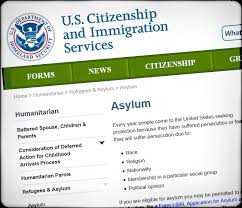POSTING DATE: November 12, 2018
Learn More About:
Immigration News & Updates eNewsletter © 2011 - 2018
For questions about U.S. Residency, Green Cards and Immigration Visas, Visit our Website at: www.ImmigrateToday.com or call our office at: (954) 382-5378
Check Out This Cool Stuff For Immigrants....
Immigration
Questions & Answers
This Week's Immigration News
Question: I got my citizenship back in 2014 and have been filing my taxes every year, the problem is that I owe back taxes. I had my own business and didn’t get paid with deductions for taxes, so now I have two years that I filed my return by the deadline, but I owe taxes for both years and I haven’t got a payment plan with the tax dept yet. I have a regular job now and I make $48k per year in a paycheck. My question is whether I can sponsor my wife for her green card since I owe back taxes? Do I have to wait until I have paid everything up?
Answer: Immigration regulations relating to the payment of taxes are different when it comes to Naturalization, as opposed to sponsoring a family member for residency. For Naturalization, a resident must demonstrate that they have “good moral character” for the immediate five years preceding the application (three years for spouses of U.S. Citizens who file for Early Naturalization). As part of showing good moral character, a resident who owes delinquent taxes must prove that they have entered into a formal payment plan with the IRS for a specific payment amount each month and provide proof that they have been making all required payments in a timely manner.
When sponsoring a family member for residency, a resident or U.S. Citizen only needs to provide proof that they have filed their taxes for the preceding three years and that their current income meets the I-864 Affidavit of Support minimum guidelines. In your case, the fact that you owe back taxes will not prevent you from sponsoring your spouse, as long as you show that you have filed your past three years’ tax returns and as long as your current income meets the minimum guidelines.
Helpful Immigration Tips You Can Use...
Immigration News & Updates eNewsletter
eNewsletter
Immigration How To:
Do I Need To File An Affidavit of Support To Sponsor My Child?
You Can Now Pay Your USCIS Filing Fees Using Credit,
Debit and Even Gift Cards!
The USCIS recently provided the option of paying immigration application fees by credit card, including: Visa, MasterCard, American Express, Discover, even gift and prepaid cards.
To use the new service, applicants must download and complete form G-1450, then place the completed and signed form on top of the application. However, note that and a credit card payment cannot be combined with a check or money order to make the required USCIS filing fee on the same one application. For instance, if the Naturalization application filing fee of $725 is to be paid using a credit card, the payment cannot be broken up between a combination of a credit card and a check. The entire payment must be made by either credit card or check.
Affidavits of Support Are Not Required For Certain Minor Children Of U.S. Citizens
Children of a U.S. Citizen parent who are under age 18 at the time of immigrating, are not required to have an Affidavit of Support filed on their behalf? Eligible children under age 18 who become U.S. Residents (Green Card holders) and by operation of law, automatically become U.S. Citizens, are not required to have an Affidavit of Support filed on their behalf.
This is true for children immigrating from abroad through a U.S. Consulate, as well as children adjusting status to U.S. Residency inside the U.S. through a U.S. Citizen biological parent. In these cases, the U.S. Citizen parent must file form I-864W, Intending Immigrant's Affidavit of Support Exemption, instead of form I-864 Affidavit of Support.
Federal Appeals Court Blocks Trump From Terminating DACA!
In yet another blow to the Trump Administration’s attempt to end DACA, the U.S. Court of Appeals for the Ninth Circuit ruled against Trump last week, forcing him to continue the DACA program. In its decision, the court upheld a lower court’s decision which prevented the administration from terminating the Deferred Action for Childhood Arrivals (DACA) program.
The court noted it was created because of the "cruelty and wastefulness of deporting productive young people to countries with which they have no ties." The recent decision comes in response to Trump’s announcement last Fall to cancel the DACA program and resulting lawsuits filed by numerous states seeking to prevent Trump from terminating the DACA program.
Trump Issues Proclamation Placing New Restrictions On Asylum Applications
As Deportations Reach Record High, USCIS
Expands Immigration Categories For Removal
As part of the Trump’s “zero tolerance” policy, his administration has been ramping up immigration enforcement across all areas of immigration, both legal and illegal since taking office.
As a result, a newly released report finds that deportations have skyrocketed over the past year, hitting a record high of 287,741 for 2018, according to Syracuse University's Transactional Records Access Clearinghouse (TRAC). More non-criminal immigrants were removed from the U.S. than ever in past years.
Question: My wife came to Miami legally in 2012 then changed over to a student. She graduated with her associates degree in 2014 and then never left. We met last year I 2017 and recently got married. We have been reading about this new deportation law and saw that it includes the form i-485 for residency. That is the form we need to file for my wifes immigration case. We are afraid that if we file it, she could get deported because her status expired. Can you please help us on this matter?
Answer: That is a great question. Yes, the new NTA policy, which went into effect on October 1, 2018 does apply to applicants filing form I-485 for adjustment of status in the U.S., but it is only a concern for those who are denied. The main problem issue is that many immigrants in the U.S. either file the I-485 for residency when they are not eligible, or fail to file their residency cases correctly, meaning fully providing all the supporting documentation required by the USCIS. This often results in unnecessary denials. Now, the ramifications of filing for residency is much more serious than in the past, since denials result in deportation notices. As long as an applicant is legally eligible for residency and the case is filed properly, there should be no risk of denial. We can take care of properly filing your wife’s residency case for you and making sure that all the requirements for eligibility are met. Give my assistant Frances a call to schedule a free consultation.
The Justice department is appealing the ruling to the U.S. Supreme Court. With the addition of Kavanaugh, the Supreme Court now has a 5-4 conservative majority, making it likely that the Court could agree with the Trump Administration that President Obama had exceeded his executive authority in creating the program, a ruling which would likely come in mid 2019. Stay tuned….
In accordance with this policy, in June 2018 the USCIS announced that it would begin issuing deportation notices to individuals who filed immigration applications and are deemed to be out of lawful immigration status at the time a denial is issued. It’s called the NTA policy, meaning that in these denied cases, a “Notice To Appear” for deportation is issued. Of course due to ever increasing immigration application processing times, many if not most individuals filing applications for Residency or change of status naturally have a lapse in status while their immigration applications are pending. This seems to be part of the administration’s evil plan!
The first phase of the NTA policy implemented on October 1, 2018, applies to immigrants who are denied for family-based residency (form I-485) and non-immigrants whose applications to change or extend status (form I-539) are denied. I-539 applications are generally filed by visitors to the U.S. who wish to extend their stay in the U.S., or change status to a student or other visa. Once a USCIS denial is issued, an NTA is issued to applicants whose period of authorized stay has expired. An individual with an expired period of authorized stay is technically considered to be ”unlawfully present” in the U.S. at the time of denial. This includes those who file an application while they are still in legal status, but due to the time involved in processing the immigration case, have fallen out of legal status by the time a denial of the case is issued. The initial application of the NTA policy covered an extremely wide range of circumstances, including millions of family sponsored applications to adjust status to residency in the U.S. and non-immigrant change or extension of status applications.
In a new announcement last week, the USCIS warns that beginning November 19, 2018, it is further expanding the program to include issuing deportation notices to individuals who receive denials for even more types of immigration applications, including T visas Form I-914/I-914A (victim of human trafficking), U visas Form I-918/I-918A (victim of crime), I-360, Petition for Amerasian, Widow(er), or Special Immigrant (Violence Against Women Act self-petitions and Special Immigrant Juvenile Status petitions), I-730, Refugee/Asylee Relative Petitions when the beneficiary is present in the US and I-929 and Petition for Qualifying Family Member of a U-1 Nonimmigrant.
This expanded application of the NTA policy is particularly troublesome for Violence Against Women Act (VAWA), so called “Battered Spouse” petitions. Immigrants who are abused by their Resident or Citizen spouses often file I-360 applications with the USCIS which are denied due to lack of documentary evidence of the abuse. Going forward, many battered spouses will now find themselves in deportation through no fault of their own, therefore being victimized twice, once from the abuser, then finally by USCIS.
Background on NTA Policy
Read the Syracuse University's Transactional Records Access Clearinghouse (TRAC) report
Last week Trump issued a proclamation to restrict the rights of immigrants to apply for asylum in the U.S.. The new policy seeks to deny asylum to migrants who enter the country illegally. This new restriction contradicts existing immigration regulations which allow immigrants to apply for asylum no matter how they entered the U.S..
Trump’s clear contravention of the law resulted in the immediate filing of lawsuits to stop the administration from carrying out the new policy, challenging the administrations arbitrary change in rules which only Congress or the courts have the right to make. According to officials, some 70,000 refugees who enter the country illegally file claims asylum. Under the announced policy, only those who have entered through legal U.S. ports of entry, including airports, are eligible to make an asylum claim. However, according to authorities, there are long backlogs at many entry ports, including those at the southern border with California, Arizona and Texas, with many individuals being forced to wait up to five weeks to make an asylum claim at the main crossing station.
Trump told reporters that he soon plans to issue an order ending Birthright Citizenship, which gives all children born on American soil automatic U.S. Citizenship. "We're signing it. We're doing it," he said, adding his effort to end it will "probably" go the Supreme Court.
Presidential Proclamation Addressing Mass Migration Through the Southern Border of the United States
USCIS Policy Guidance on new policy
Question: I got my citizenship back in 2010 and filed to sponsor my son, his wife and their 2 kids, it got approved and they are waiting in the line. My son is 31 and my grandchildren are 16 and 19. My son and his wife recently split up and have decided to get divorced. I want to find out what will happen to the immigration case I filed for them once they are divorce. Will my ex daughter in law and grandkids still be able to immigrate since they were included in the immigration application before the divorce? How long will it take them to immigrate once they are divorced? Will my 19 year old granddaughter still be eligible even though she is now over age 18? Thank you for your help.
Answer: Under immigration regulations, once the married child of a U.S. Citizen divorces, they move from the immigration category F3 (married children of U.S. Citizens) to F1 (single adult children of U.S. Citizens). The F3 category waiting line is about 12+ years, compared with 7 for the F1 category. The change of category is not automatic and is only converted to the faster category once the USCIS or National Visa Center (NVC) is notified of the change and provided with a copy of the certified Divorce Decree. If a visa is available in the F1 immigration category, at that point the NVC puts the case in line for consular processing.
Unfortunately, once your son and daughter in law divorce, she is no longer eligible to immigrate to the U.S. along with your son and grandchildren. However, you don’t need to worry about your granddaughter being able to immigrate, since she remains eligible until age 21. Since the date you filed the I-130 petition for your son is 2010, and immigrant visas are now available in the F1 family category up to 2011, he and your grandchildren will be able to immigration soon after the NVC is notified. I will email you a list of the documents you will need to provide me to covert the case, which will include a copy of the certified divorce decree and birth certificates for your children.
Also, USCIS filing fees and biometrics fee for each form can be paid together on one form. For instance form I-90, Application to Replace Permanent Resident Card, the filing fee is $ 455 and the Biometrics fee is $85, so the entire USCIS filing fee of $540 if paid by credit card, can be paid using the same form G-1450. For Immigration cases which contain multiple applications with separate filing fees, a separate Form G-1450 should be used for each application requiring a separate USCIS filing fee.
Before sending your Immigration application with a credit card payment, be sure to make certain that you have enough credit left on your account to cover the payment, otherwise, the USCIS will reject your application.












